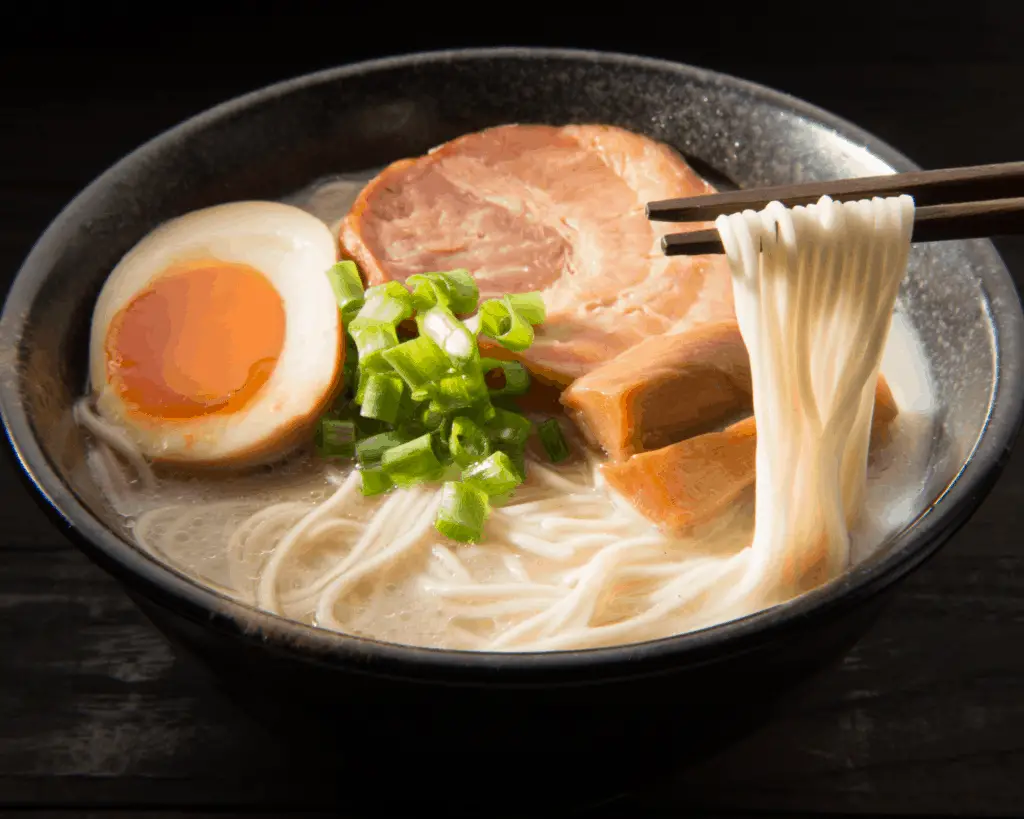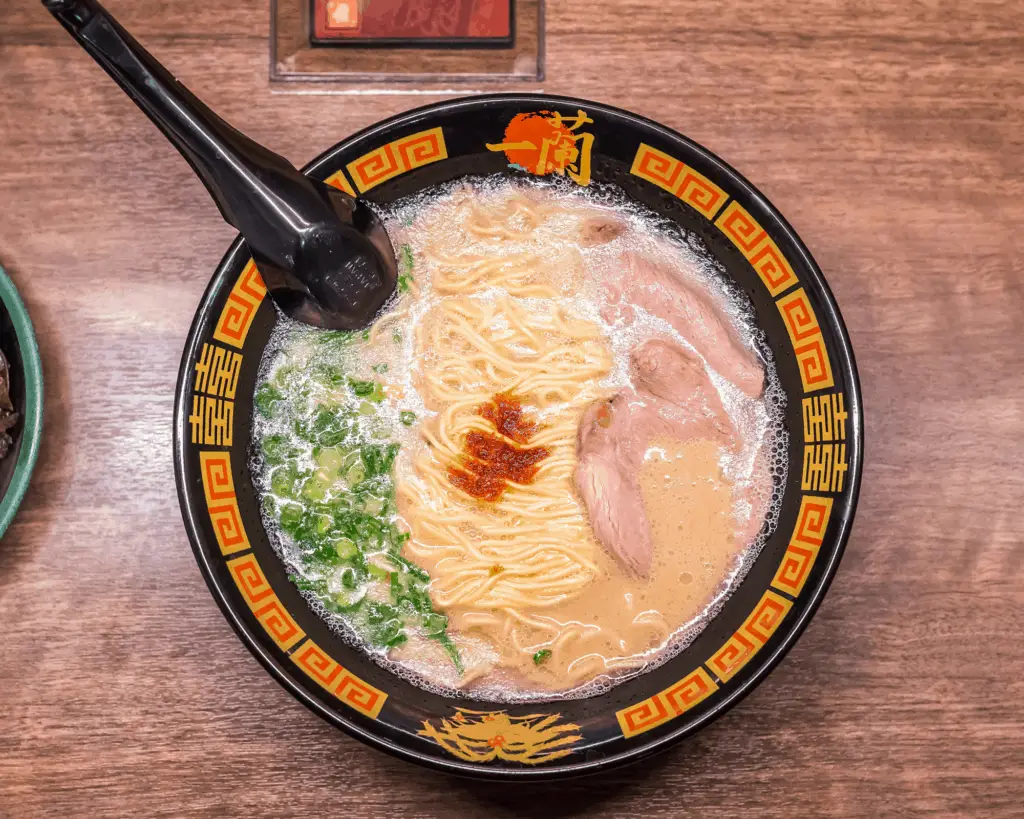If you’re one of the 36% of Americans who are lactose-intolerant, then making sure that you’re not consuming dairy products is of utmost importance. The last thing you want is for that great-tasting lunch you ate to cause you stomach problems and ruin the rest of your day.
So, with that being said, does ramen have dairy?
No, ramen is not made with dairy. This goes for both storebought ramen and the ramen you’ll buy at your favorite noodle house. Although some pre-packaged seasoning packets may contain small amounts of lactose, the noodles themselves contain no trace of dairy.


In today’s post, I’m going to take a couple of minutes to address the common misconception that ramen contains dairy. I’ll explain why some people think the dish is made with dairy, and also answer some other questions related to dairy content and ingredients in ramen. Lastly, I’ll explain the difference between traditional ramen and the specialty “milk ramen” dishes.
Are Ramen Noodles Made With Milk?
The other day, my friend and I were out at one of my favorite local Japanese restaurants. It was my turn to pay for lunch, so I ordered a couple of bowls of my favorite ramen. Then, my friend suddenly asked, “Wait; aren’t ramen noodles made with milk? I’m lactose-intolerant.”
I’d never considered if there was milk in ramen before, so I double-checked with the waiter to make sure. He quickly explained that it’s a common misconception that ramen noodles contain dairy because ramen noodles are made from an egg noodle base.
However, lactose-intolerant individuals will be happy to find out that ramen noodles are not made using any dairy. This means you can eat ramen to your heart’s content without having to worry about those nasty “side effects” that milk-based products typically give you.

Why Does Packaged Ramen Say “Contains Lactose?”
Nine times out of ten, I’m either eating fresh ramen purchased from a noodle shop or making my own ramen from scratch and freezing the leftovers. However, in my younger days, cheap store-bought ramen was my go-to “broke meal” that got me through college.
If you’re like me and you actually read the labels on food packaging, then you may notice that certain brands of store-bought ramen say “contains lactose” or “contains dairy” on the side.
Now, you’re probably thinking, “But wait, didn’t this guy just say that ramen noodles DON’T have dairy?”
Well, if you look a little bit closer, you’ll realize that the dairy content is only in the little foil seasoning packets that come with each pouch of dried noodles. Specifically, it’s lactose power, and it’s added to create a creamier texture and consistency for the soup.
If you’re sensitive to small amounts of lactose, then you’ll want to avoid these extra seasoning pouches and use your own non-lactose seasonings instead. However, if you’re not super-sensitive to small amounts, then you may not be affected by it. This is completely up to your discretion, though, as you know how your body responds better than anybody.
Is Ramen Safe For Lactose-Intolerant Individuals?
All of the above being said, yes; ramen is perfectly safe for lactose-intolerant individuals. If you’re sensitive to small amounts of lactose, then I would suggest staying away from processed seasoning packets, as these can have traces of milk powder in them. However, if you’re making your own homemade ramen or buying ramen from a noodle house, there’s no reason why any milk should be in your ramen noodle soup.
Is Ramen Dairy Free?
Generally speaking, ramen is a dish that is free of dairy products. The traditional Japanese style usually consists of wheat-based noodles in a flavorful broth with various toppings such as scallions, fish cake, nori (seaweed), and eggs. While the broth itself may contain a small amount of butter or oil, these are generally not considered dairy products, making ramen vegan-friendly. Ramen noodles can be prepared with either vegetable or animal stock bases, including pork, chicken, and beef.
Are Eggs Considered A Dairy Food?
Although ramen doesn’t have to be made with eggs, many people choose to add a cut soft or hard-boiled egg as an extra ingredient in their ramen. For some reason, people have this misconception that eggs are dairy because they’re often found in or around the dairy section of most grocery stores.
However, eggs are not dairy in the slightest. Otherwise, the egg noodles used to make ramen would have to be substituted with rice noodles. This is not the case, and you can eat all of the egg-based ramen noodles or add eggs to your ramen without it affecting your lactose sensitivity.
Is There Ramen With Milk
Yes, there are a few variations of ramen that include milk as an ingredient. One example is a type of ramen called tonkotsu ramen, which is made with a creamy, pork-based broth that is thickened with milk. The milk is usually added to the broth after the pork bones have been simmered for a long time, and it helps to give the broth a rich, velvety texture.
Another variation of ramen that includes milk is mazemen, which is a type of ramen that is served with a sauce made from a combination of broth and other ingredients like milk, butter, and soy sauce. Mazemen is typically served with noodles, meat, and vegetables, and it is known for its rich, savory flavor.
Does Tonkotsu Ramen Have Dairy?
Tonkotsu ramen is a popular Japanese noodle dish, made with pork bone broth and typically served with various toppings including sliced pork, seaweed, green onion, egg, and fish cake. While the broth is traditionally dairy-free, some restaurants may choose to add ingredients such as butter or cream to their tonkotsu ramen. The dish is usually served in a large bowl and can be accompanied by sides such as boiled gyoza, tempura or fried chicken.
What Is “Milk Ramen?”
Before we go, I figured that I’d briefly mention “milk ramen.” Although it’s not considered typical of ramen, some noodle houses offer this specialty dish that’s made using fresh milk or cream in the broth. This type of soup does have lots of milk/lactose, so if you’re lactose-intolerant, then I’d definitely recommend staying away from this dish!
Conclusion
At the end of the day, no ingredient in ramen should have any dairy or lactose in it. The only exceptions are special “milk ramen” dishes (which are clearly labeled) and some of the processed seasoning packets that are made with lactose powder.
As long as you’re making your own ramen with your own seasoning or ordering ramen from a legitimate noodle house, then it’s perfectly safe for lactose-intolerant eaters!